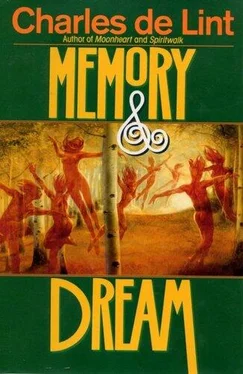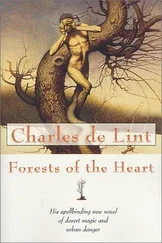Charles De Lint - Memory and Dream
Здесь есть возможность читать онлайн «Charles De Lint - Memory and Dream» весь текст электронной книги совершенно бесплатно (целиком полную версию без сокращений). В некоторых случаях можно слушать аудио, скачать через торрент в формате fb2 и присутствует краткое содержание. Год выпуска: 1994, ISBN: 1994, Издательство: Tor, Жанр: Ужасы и Мистика, на английском языке. Описание произведения, (предисловие) а так же отзывы посетителей доступны на портале библиотеки ЛибКат.
- Название:Memory and Dream
- Автор:
- Издательство:Tor
- Жанр:
- Год:1994
- ISBN:ISBN 0-312-85572-9
- Рейтинг книги:3 / 5. Голосов: 1
-
Избранное:Добавить в избранное
- Отзывы:
-
Ваша оценка:
Memory and Dream: краткое содержание, описание и аннотация
Предлагаем к чтению аннотацию, описание, краткое содержание или предисловие (зависит от того, что написал сам автор книги «Memory and Dream»). Если вы не нашли необходимую информацию о книге — напишите в комментариях, мы постараемся отыскать её.
This is the novel Charles de Lint’s many devoted readers have been waiting for, the compelling odyssey of a young woman whose visionary art frees ancient spirits into the modern world.
Isabelle Copley’s visionary art frees ancient spirits. As the young student of the cruel, brilliant artist Vincent Rushkin, she discovered she could paint images so vividly real they brought her wildest fantasies to life. But when the forces she unleashed brought tragedy to those she loved, she turned her back on her talent—and on her dreams.
Now, twenty years later, Isabelle must come to terms with the shattering memories she has long denied, and unlock the slumbering power of her brush. And, in a dark reckoning with her old master, she must find the courage to live out her dreams and bring the magic back to life.
Charles de Lint’s skillful blending of contemporary urban characters and settings with traditional folk magic has made him one of the most popular fantasy authors of his generation.
Memory and Dream is the most ambitious work of de Lint’s extraordinary career, an exciting tale of epic scope that explores the power our dreams have to transform the world-or make it a waking nightmare.
It is the story of Isabelle Copley, a young artist who once lived in the bohemian quarter of the northern city of Newford. As a student of Vincent Rushkin, a cruel but gifted painter, she discovered an awesome power—to craft images so real that they came to life. With her paintbrush she called into being the wild spirits of the wood, made her dreams come true with canvas and paint. But when the forces she unleashed brought unexpected tragedy to those she loved, she ran away from Newford, turning her back on her talent-and on her dreams.
Now, twenty years later, the power of Newford has reached out to draw her back. To fulfill a promise to a long-dead friend, Isabelle must come to terms with the shattering memories she has long denied, and unlock the slumbering power of her brush. She must accept her true feelings for her newfound lover John Sweetgrass, a handsome young Native American who is the image of her most intense imaginings. And, in a dark reckoning with her old master, she must find the courage to live out her dreams, and bring the magic back to life.
Charles de Lint - Novelist, poet, artist, and musician, Charles de Lint is one of the most influential fantasy writers of his generation. With such warmly received works as Spiritwalk, Moonheart, Into the Green, and Dreams Underfoot(also set in the town of Newford), he has earned high praise from readers and critics alike, Booklist has called him “one of the most original fantasy writers currently working.” And The Magazine of Fantasy and Science Fiction writes: “De Lint shows us that, far from being escapism, contemporary fantasy can be the deep, mythic literature of our time.” De Lint and his wife MaryAnn Harris, an artist, live in Ottawa, Ontario, Canada, where they are both Celtic musicians in the band Jump At the Sun. “For more than a decade, Charles de Lint has enjoyed a reputation as one of the world’s leading fantasists.”— “A superb storyteller. De Lint has a flair for tales that blur the lines between the mundane world and magical reality, and nowhere is this more evident than in his fictional city of Newford.”— “De Lint can feel the beauty of the ancient lore he is evoking. He can well imagine what it would be like to conjure the Other World among ancient standing stones. His characters have a certain fallibility that makes them multidimensional and human, and his settings are gritty. This is no Disneylike Never-Never Land. Life and death in de Lint’s world are more than a matter of a few words or a magic crystal.” – “There is no better writer now than Charles de Lint at bringing out the magic in contemporary life ... The best of the post-Stephen King contemporary fantasists, the one with the clearest vision of the possibilities of magic in a modern setting.” — “In the fictional city of Newford, replete with the brutal realities of modern urban life, de Lint’s characters encounter magic in strange and unexpected places ... In de Lint’s capable hands, modern fantasy becomes something other than escapism. It becomes folk song, the stuff of urban myth.” —











